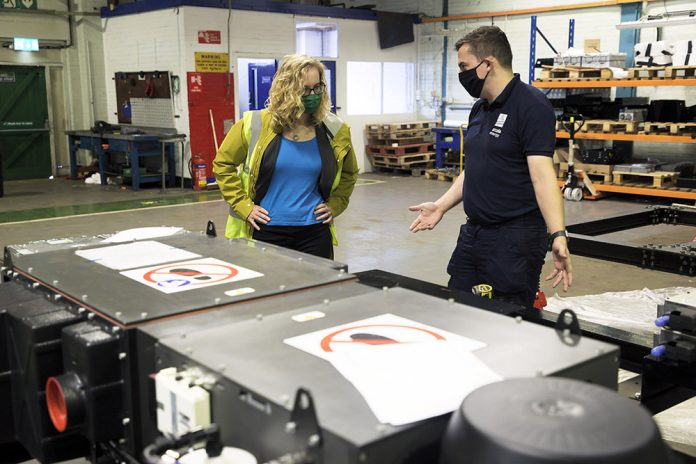Training for the next generation of renewable professionals, putting climate change resources into schools and harnessing apprentice talent to solve low carbon industry challenges.
Just three of the actions taken under a raft of projects from the first year of Scotland’s Climate Emergency Skills Action Plan.
Launched in December 2020, the plan will ensure Scotland’s workforce has the skills needed for the transition to a net-zero economy.
Minister for Green Skills, the Circular Economy & Biodiversity Lorna Slater said: “As an engineer who has worked in Scotland’s growing renewable energy industry, I know how essential it is for the Scottish Government to invest in skills development.”
“Scotland has enormous potential to be a global leader in the green industries of the future, but to take this opportunity we need to equip people with the skills they need to shape and transition through their careers”
“This first year of the action plan has demonstrated a collective will to achieve, and it shows Scotland is on the right track.”
The plan is overseen by a steering group made up of more than 20 organisations across Scotland, coordinated by Skills Development Scotland (SDS) and Scottish Government.
Chris Brodie, Director of Regional Skills Planning & Sector Development at SDS said: “The move to net-zero by 2045 has the potential to create tens of thousands of well paid, highly skilled jobs over the next 20 years.
“This action plan is making sure we seize those sustainable skills opportunities for everyone learning and working here in Scotland.
“The climate emergency is happening now, which is why we have such a strong focus on reskilling and upskilling our existing workforce.”
The first year of the action plan also saw the launch of the Green Jobs Workforce Academy and further support for businesses including bespoke climate emergency training and development of a net zero toolkit to support engineering SMEs.
There was also targeted support through the National Transition Training Fund and Green Jobs Fund.
Developed in partnership between public, private and the third sector, the action plan is industry and evidence led.
Professor Dave Reay, climate change scientist at the University of Edinburgh, is Chair of action plan’s Implementation Steering Group.
He said: “This action plan identifies a series of priority areas for employers, education and individuals and is a leading example of planning for sustainable skills against climate change targets.
“Throughout discussions and events at COP26 this year it was clear that Scotland is well-placed to take advantage, in particular, of the green energy boom that is starting across the globe. But as we move forward, every job needs to become more sustainable.
“Our skills system is well equipped to deal with the rapid adjustment to face the challenge of net zero and we will continue to work together to drive change as we take the plan forward.”
Work is also continuing on the Green Jobs Skills Hub which will offer insight into the numbers and types of sustainable jobs that will be needed over the next 25 years, as well recommendations from the Scottish Apprenticeship Advisory Board’s work on sustainable skills in apprenticeships.
Chris Brodie added: “Robust data is key to supporting businesses, education and training providers and individuals as we move ahead and that will be a key focus of the plan heading in to 2022.”






